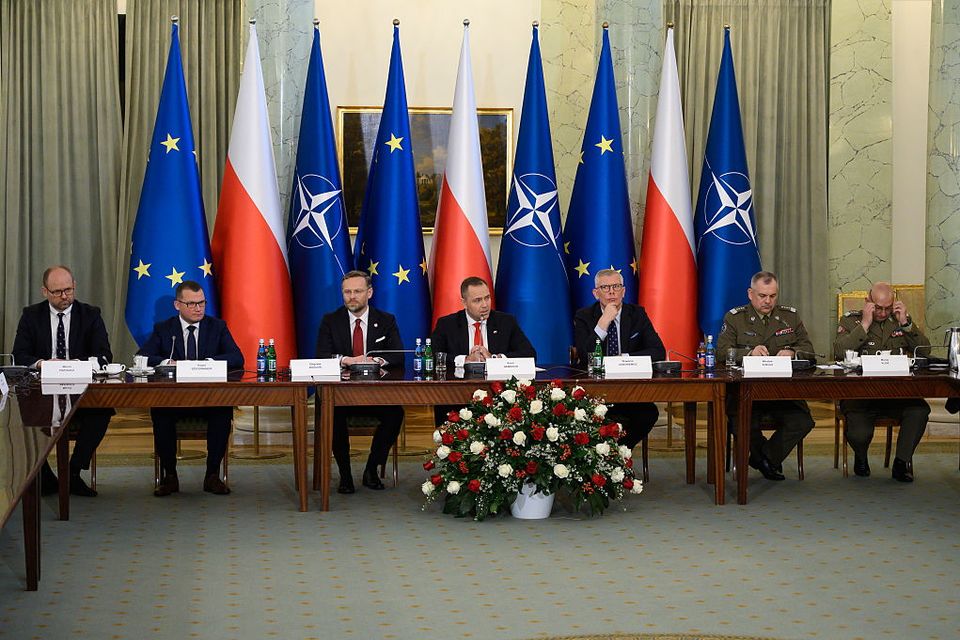World
NATO Strengthens Eastern Flank After Poland Intercepts Russian Drones

NATO has announced plans to strengthen the defence of Europe’s eastern flank following an incident in which Poland shot down Russian drones that entered its airspace. This event marks the first known military action of its kind by a NATO member during the ongoing conflict in Ukraine. Polish officials have described the drone incursions as attempts by Russia to assess NATO’s response capabilities.
During a press conference on March 15, 2024, NATO Secretary General Jens Stoltenberg characterized the incursions as “reckless and unacceptable.” He emphasized the necessity of protecting allied airspace, stating, “We can’t have Russian drones entering allied airspace.” The statement came shortly after Poland’s foreign minister dismissed comments by former US President Donald Trump, who suggested the drone incidents might have been accidental.
Marcin Bosacki, Poland’s Secretary of State, delivered a statement to the media, expressing hope that the United States would act to demonstrate solidarity with Warsaw. Later, the US, alongside other Western allies, condemned the drone incursions, accusing Moscow of violating international law and the UN Charter.
NATO’s Operation “Eastern Sentry” Launched
In response to the heightened tensions, NATO has initiated operation “Eastern Sentry,” which commenced on the evening of March 15, 2024. This operation will involve the integration of various military assets, including air and ground forces, from member states. Countries such as Denmark, France, Britain, and Germany have committed to participating in this mission, with others expected to join.
The operation aims to enhance the defence mechanisms along NATO’s eastern flank, which stretches from the Baltic states in the north to Romania and Bulgaria in the south. Although NATO has a significant presence in Eastern Europe, including thousands of troops, the exact number of additional forces for this mission has not been disclosed. However, the alliance did announce the deployment of specific military assets, such as two F-16 fighter jets and a frigate from Denmark, three Rafale fighter jets from France, and four Eurofighter jets from Germany. Britain has also indicated it will contribute to the mission, with specifics to be shared soon.
Escalating Tensions and Broader Implications
The incident has generated significant concern among European leaders regarding the potential for more aggressive actions from Russia. Polish Prime Minister Donald Tusk publicly refuted Trump’s assertion that the drone attack could have been a mistake, stating, “We would also wish that the drone attack on Poland was a mistake. But it wasn’t. And we know it.”
Germany has responded to the drone incursions by extending its air policing operations over Poland and summoning the Russian ambassador for discussions. Similarly, France has taken diplomatic steps by calling in the Russian envoy to express its concerns.
This week’s developments have raised questions about NATO’s capability to respond effectively to drone warfare, which has become a prominent feature of the conflict in Ukraine since Russia’s invasion in 2022. European leaders argue that the incident underscores Russia’s lack of interest in pursuing peace negotiations in Ukraine, especially following a recent meeting between Trump and Russian President Vladimir Putin in Alaska.
Kremlin spokesperson Dmitry Peskov has downplayed the concerns regarding Russia’s military exercises with Belarus, describing the apprehension among Western European nations as “emotional overload.” He asserted that Russia does not pose a threat to Europe, despite the ongoing military maneuvers.
As the situation continues to evolve, NATO’s actions will be closely monitored, not only for their immediate impact on regional security but also for their implications for broader international relations amid ongoing tensions between Russia and Western nations.
-

 Top Stories2 months ago
Top Stories2 months agoTributes Surge for 9-Year-Old Leon Briody After Cancer Battle
-

 Entertainment3 months ago
Entertainment3 months agoAimee Osbourne Joins Family for Emotional Tribute to Ozzy
-

 Politics3 months ago
Politics3 months agoDanny Healy-Rae Considers Complaint After Altercation with Garda
-

 Top Stories3 months ago
Top Stories3 months agoIreland Enjoys Summer Heat as Hurricane Erin Approaches Atlantic
-

 World4 months ago
World4 months agoHawaii Commemorates 80 Years Since Hiroshima Bombing with Ceremony
-

 Top Stories2 months ago
Top Stories2 months agoNewcastle West Woman Patricia Foley Found Safe After Urgent Search
-

 Top Stories4 months ago
Top Stories4 months agoFianna Fáil TDs Urgently Consider Maire Geoghegan-Quinn for Presidency
-

 World4 months ago
World4 months agoGaza Aid Distribution Tragedy: 20 Killed Amid Ongoing Violence
-

 World4 months ago
World4 months agoCouple Convicted of Murdering Two-Year-Old Grandson in Wales
-

 Top Stories3 months ago
Top Stories3 months agoClimbing Errigal: A Must-Do Summer Adventure in Donegal
-

 World4 months ago
World4 months agoAristocrat Constance Marten and Partner Convicted of Infant Murder
-

 Top Stories3 months ago
Top Stories3 months agoHike Donegal’s Errigal Mountain NOW for Unforgettable Summer Views









